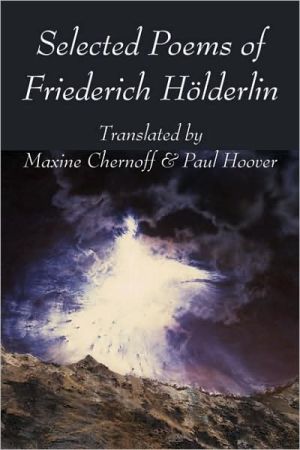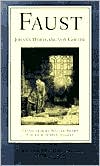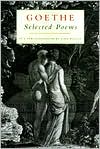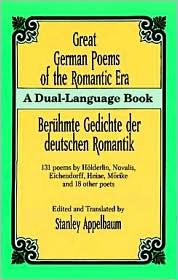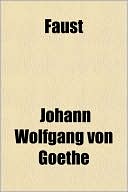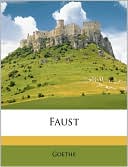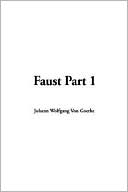Selected Poems of Friedrich Holderlin
Further solidifying Hölderlin’s place in history, this thorough collection of poetry ranges from the odes of his developmental period to the majestic hymns and strangely prophetic modern compositions created in his later years. Considered one of the founders of European romanticism, Hölderlin had a mere 10 years to develop his distinctive style before falling prey to a debilitating mental illness, whose resultant works are the heartbreakingly sweet and melancholy pieces of the Späteste...
Search in google:
Further solidifying Hölderlin’s place in history, this thorough collection of poetry ranges from the odes of his developmental period to the majestic hymns and strangely prophetic modern compositions created in his later years. Considered one of the founders of European romanticism, Hölderlin had a mere 10 years to develop his distinctive style before falling prey to a debilitating mental illness, whose resultant works are the heartbreakingly sweet and melancholy pieces of the Späteste Gedichte (Last Poems). Each poem is presented in both its original German and a new English translation, while an illuminating introduction explores Hölderlin’s significance in the realm of literature as well as the tumultuous world in which he lived.Publishers WeeklySublime visionary, great religious poet attracted to pagan myth and German poet of world-historical importance, Hölderlin (1770-1843) at the turn of the 19th century made his mark with Greek-inspired odes, intensely heterodox (and often never completed) hymns to imagined gods and real European places, and elegies on love. All these great works came about before 1807, when the tormented writer suffered a mental breakdown. Despite his importance to subsequent German poets (Rilke) and philosophers (Heidegger), and despite careful translations, Hölderlin has never enjoyed the U.S. following attracted by (for example) the author of The Duino Elegies. That may change with this ample yet sensitive facing-page version. Husband and wife team Chernoff and Hoover-both are experimental poets, fiction writers and editors-do best with the strangest (most clearly "modern") stanzas and pieces of unfinished hymns, but also give fine attention to the earlier, more elegant works and to the naïve rhyming poetry of Hölderlin's last years. Here is the Hölderlin who praised "The Poet's Courage," asking, "Isn't everything alive already in your blood?" Here too is the poet for whom modern life is at once opportunity and abyss: "I approached to see the gods," he wrote, "[a]nd they themselves threw me down beneath the living." (Sept.)Copyright © Reed Business Information, a division of Reed Elsevier Inc. All rights reserved.
Introduction7'When I was a boy'13To Diotima14Diotima15Plea for Forgiveness16'Once there were gods'17Parting18'Another day'19'The sun goes down'20To the Sun God21To the Fates22Fate. Hyperion's Song23That which is mine24The Gods26Sung under the Alps27The Archipelago28Bread and Wine36Homecoming41The Journey44The Rhine48Patmos54Remembrance60The Ister62Mnemosyne64Tears66Ganymede67Chiron68To Hope70Ages of Life71Half of Life72'As birds slowly pass over'73'As upon seacoasts'74Home75'For when the juice of the vine'76'On pale leaves'77'When over the vineyard'78The Eagle79'Where we began'80'Severed and at a distance now'81'When out of heaven'83Spring ('When new joy quickens')84A Happy Life85The Walk87'Not all days'88Spring ('How blessed to see again')89Autumn90Spring ('The new day comes down')91View91Concerning the Dolphin92From Sophocles' Ajax93From Sophocles' Antigone96From Sophocles' Oedipus the King99'In a lovely blue'103Notes105
\ Publishers WeeklySublime visionary, great religious poet attracted to pagan myth and German poet of world-historical importance, Hölderlin (1770-1843) at the turn of the 19th century made his mark with Greek-inspired odes, intensely heterodox (and often never completed) hymns to imagined gods and real European places, and elegies on love. All these great works came about before 1807, when the tormented writer suffered a mental breakdown. Despite his importance to subsequent German poets (Rilke) and philosophers (Heidegger), and despite careful translations, Hölderlin has never enjoyed the U.S. following attracted by (for example) the author of The Duino Elegies. That may change with this ample yet sensitive facing-page version. Husband and wife team Chernoff and Hoover-both are experimental poets, fiction writers and editors-do best with the strangest (most clearly "modern") stanzas and pieces of unfinished hymns, but also give fine attention to the earlier, more elegant works and to the naïve rhyming poetry of Hölderlin's last years. Here is the Hölderlin who praised "The Poet's Courage," asking, "Isn't everything alive already in your blood?" Here too is the poet for whom modern life is at once opportunity and abyss: "I approached to see the gods," he wrote, "[a]nd they themselves threw me down beneath the living." (Sept.)\ Copyright © Reed Business Information, a division of Reed Elsevier Inc. All rights reserved.\ \
